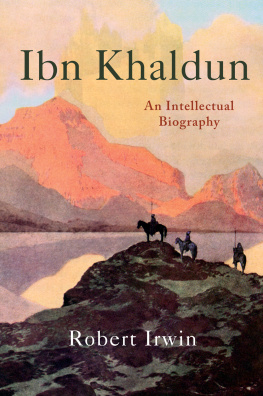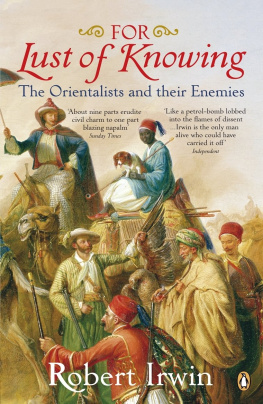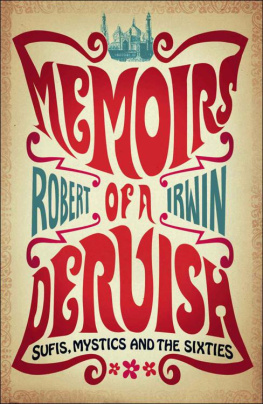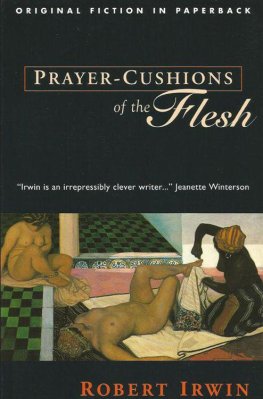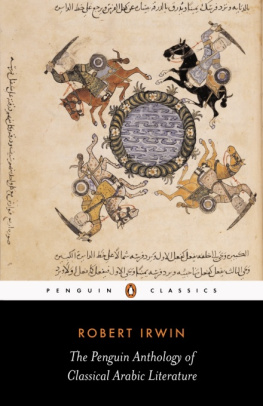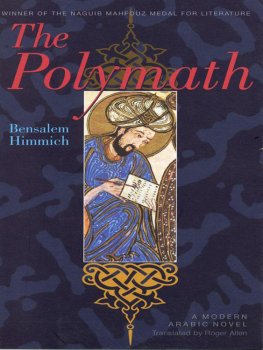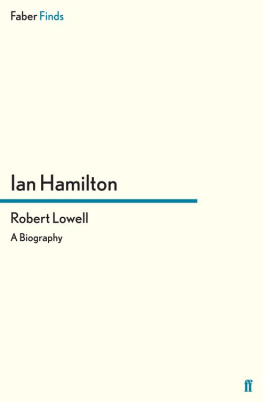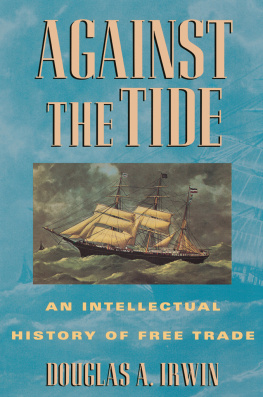Robert Irwin - Ibn Khaldun : An Intellectual Biography
Here you can read online Robert Irwin - Ibn Khaldun : An Intellectual Biography full text of the book (entire story) in english for free. Download pdf and epub, get meaning, cover and reviews about this ebook. year: 2018, publisher: Princeton University Press, genre: Religion. Description of the work, (preface) as well as reviews are available. Best literature library LitArk.com created for fans of good reading and offers a wide selection of genres:
Romance novel
Science fiction
Adventure
Detective
Science
History
Home and family
Prose
Art
Politics
Computer
Non-fiction
Religion
Business
Children
Humor
Choose a favorite category and find really read worthwhile books. Enjoy immersion in the world of imagination, feel the emotions of the characters or learn something new for yourself, make an fascinating discovery.
- Book:Ibn Khaldun : An Intellectual Biography
- Author:
- Publisher:Princeton University Press
- Genre:
- Year:2018
- Rating:3 / 5
- Favourites:Add to favourites
- Your mark:
- 60
- 1
- 2
- 3
- 4
- 5
Ibn Khaldun : An Intellectual Biography: summary, description and annotation
We offer to read an annotation, description, summary or preface (depends on what the author of the book "Ibn Khaldun : An Intellectual Biography" wrote himself). If you haven't found the necessary information about the book — write in the comments, we will try to find it.
Ibn Khaldun : An Intellectual Biography — read online for free the complete book (whole text) full work
Below is the text of the book, divided by pages. System saving the place of the last page read, allows you to conveniently read the book "Ibn Khaldun : An Intellectual Biography" online for free, without having to search again every time where you left off. Put a bookmark, and you can go to the page where you finished reading at any time.
Font size:
Interval:
Bookmark:
Ibn Khaldun
Ibn Khaldun
AN INTELLECTUAL BIOGRAPHY
Princeton & Oxford
Copyright 2018 by Princeton University Press
Epigraph to chapter 3 from C. P. Cavafy: Collected Poems, revised edition translated by Edmund Keeley and Philip Sherrard, edited by George Savidis. Translation copyright 1975, 1992 by Edmund Keeley and Philip Sherrard. Reprinted by permission of Princeton University Press.
Excerpts from The Muqaddimah: An Introduction to History by Ibn Khaldn. Copyright 1958, 1967 by Bollingen. Reprinted by permission of Princeton University Press.
Published by Princeton University Press,
41 William Street, Princeton, New Jersey 08540
In the United Kingdom: Princeton University Press,
6 Oxford Street, Woodstock, Oxfordshire OX20 1TR
press.princeton.edu
Jacket art: Maxfield Parrish, The City of Brass, from The Arabian Nights, ed. 1909. Reproduction courtesy of Art Passions.
All Rights Reserved
Library of Congress Cataloging-in-Publication Data
Names: Irwin, Robert, 1946- author.
Title: Ibn Khaldun : an intellectual biography / Robert Irwin.
Description: Princeton, New Jersey : Princeton University Press, [2018] | Includes bibliographical references and index.
Identifiers: LCCN 2017028272 | ISBN 9780691174662 (hardcover : alk. paper)
Subjects: LCSH: Ibn Khaldun, 1332-1406. | Historians, ArabIslamic EmpireBiography.
| HistoriographyIslamic Empire. | Islamic civilization.
Classification: LCC D116.7.I3 I79 2018 | DDC 907.2/02 [B] dc23 LC record available at https://lccn.loc.gov/2017028272
British Library Cataloging-in-Publication Data is available
This book has been composed in Sabon LT Std
Printed on acid-free paper.
Printed in the United States of America
1 3 5 7 9 10 8 6 4 2
We later civilizations... we too know that we are mortal.
Paul Valry, The Crisis of the Mind (1919)

The world historian Arnold Toynbee, who produced a twelve-volume study of the rise and fall of civilizations, described Ibn Khalduns theoretical treatise on history, the Muqaddima, as undoubtedly the greatest work of its kind that has ever been created by any mind in any time or place.
Wali al-Din Abd al-Rahman Ibn Khaldun (13321406) was born in Tunis and in the first half of his life he held various advisory and bureaucratic roles in the service of the Merinid rulers in Fez, the Hafsids in Tunis, the Abd al-Wadids in Tlemcen, and the Nasrids in Granada. In 1375 he retired to a remote castle in western Algeria where in the course of the next four years he worked on the first draft of the Muqaddima, his book on the principles of history and rise and fall of dynasties. In 1378 he reentered civilization and undertook some teaching in Tunis while consulting its libraries. He also worked on a lengthy chronicle that followed on from his book on the principles of history. In 1382 he left for Mamluk Egypt. There he held the office of chief qadi (judge) of the Maliki rite several times and he continued to work expanding and revising what he had already written. In 1400 he had a memorable meeting outside the walls of Damascus with the would-be world conqueror Timur (also known as Tamerlane). Ibn Khaldun died in Cairo and was buried in a Sufi cemetery.
The Muqaddima (Prolegomena) is a lengthy theoretical consideration of the laws of history as well as a general survey of Islamic societies and their arts and sciences. It is divided into six chapters: Chapter one deals with human society in general; chapter two, nomadic society; chapter three, states, caliphs, and kings; chapter four, civilized society and towns; chapter five, trade and ways of earning a livelihood; chapter six, sciences and arts. Though the original aim in writing the chronicle that followed, the Kitab al-Ibar wa diwan al-mubtada wal-khabar (The Book of Warning and the Collection of Beginnings and Historical Information), seems to have been to produce a history of the Berber and Arab tribes of North Africa and the dynasties that they established, as he wrote, the scope of his history expanded and became something grander. The theoretical prolegomena to the history, the Muqaddima, occupies three fat volumes in its English translation, while the standard Arabic edition of the history, the Ibar, is in seven volumes. The first draft of the Muqaddima was allegedly completed in 1377 in five months and it is on this work that Ibn Khalduns chief claim to fame rests, rather than on the history that followed it.
The first question posed in the Muqaddima is why do historians make mistakes? Three things lead to error in writing history. First, partisanship. Secondly, gullibility. Thirdly, ignorance of what is intrinsically possible. It was this third issue that first and foremost he sought to address, since earlier chroniclers had not given any serious consideration to the general laws that govern the formation and dissolution of human societies. They had not studied the batin (the interior meaning) of history, but were only compilers of the zahir (its externals). Ibn Khaldun scrutinized accounts of past events and sought to assess them on the grounds of plausibility. One needed to take account of cause and effect, then how things work when the situations are similar, and then how things work when the situations are dissimilar. This was an unusual thing for an Islamic historian to do. TheIbar is an even lengthier work, a chronicle theoretically based on the principles outlined in the Muqaddima. Another much shorter book, Al-Tarif bi Ibn Khaldun wa rihlatihi sharqan wa gharban (Presenting Ibn Khaldun and His Journeys in the East and the West), can be misleadingly described as an autobiography, even though it is somewhat short on self-revelation, for, although Ibn Khaldun had had an adventurous life, he did not present it as such.
During the last two centuries the meaning of what Ibn Khaldun wrote and its significance has been hotly debated. Was he the worlds first sociologist? Was he a sociologist at all? Did his theorizing about history owe much or anything to the principles of Greek philosophy? Has his originality been exaggerated? Islam seems to be central to his historical thought, but in what way exactly? Or was he secretly really a rationalist and an atheist? Was he a Sufi? Why did he make so many enemies in the Maghreb and in Egypt? Does his model of the cyclical rise and fall of dynasties apply outside the Maghreb? Did he think it did? Did he think that nomads were a good thing or a bad thing? Insofar as he was a futurologist as well as a historian, was he any good as a prophet?
These are some of the questions that modern commentators have tried to deal with. That there are so many interpretations of Ibn Khaldun may suggest that he did not express himself very clearly. The bibliography on him is huge. Aziz al-Azmehs Ibn Khaldun in Modern Scholarship listed over 850 items and, as the decades have passed, the number must have at least doubled.One may get a sense of half the history of Orientalism just by following the fortunes of Ibn Khaldun in European scholarship from the early nineteenth century onwards. Even so, it took a long time before he was discovered by European scholars, for he wrote in a century when Europeans had given up translating Arabic works. (The heyday for such translations was over by the twelfth century.)
There are already so many books on Ibn Khaldun that I have been hesitant to add yet another to the list. As Ibn Khaldun himself wrote: It should be known that among the things that are harmful to the human quest for knowledge and to the attainment of a thorough scholarship are the great number of works (available), the large variety in technical terminology (needed for purposes) of instruction, and the numerous (different) methods (used in those works). As far as he was concerned, there were already too many books in fourteenth-century North Africa.
Font size:
Interval:
Bookmark:
Similar books «Ibn Khaldun : An Intellectual Biography»
Look at similar books to Ibn Khaldun : An Intellectual Biography. We have selected literature similar in name and meaning in the hope of providing readers with more options to find new, interesting, not yet read works.
Discussion, reviews of the book Ibn Khaldun : An Intellectual Biography and just readers' own opinions. Leave your comments, write what you think about the work, its meaning or the main characters. Specify what exactly you liked and what you didn't like, and why you think so.

